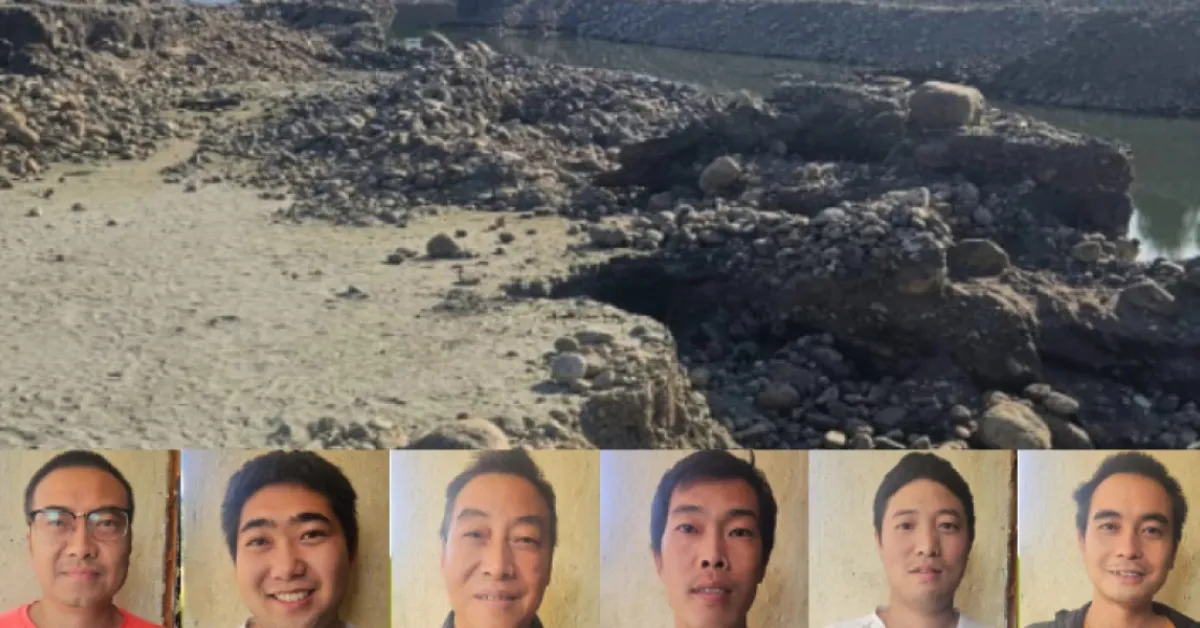Seven Chinese Nationals Jailed for Illegal Quartz Extraction in West Pokot

A Kenyan court has sentenced seven Chinese nationals to prison terms for engaging in illegal mining activities along the Wei-Wei River in West Pokot County.
This marks a significant escalation in the government's efforts to combat unauthorised resource exploitation. The ruling, delivered at the Kapenguria Law Courts on April 17, 2025, follows a coordinated enforcement operation conducted in February 2025 by the Mining Investigations Unit, in conjunction with the Ministry of Mining, Blue Economy and Maritime Affairs. The individuals convicted are Wang Youping, Xian Zhenming, He Zhouming, Wang Xiaodong, Zhao Zhenwei, Guan Qiang, and Deng Chun.
They were apprehended at an illegal mining site discovered during the enforcement operation. Authorities seized heavy-duty machinery and vehicles utilised in the unauthorised extraction of minerals, primarily quartz, which holds economic importance due to its industrial applications. The court found that the Chinese nationals lacked the requisite licenses to conduct mining operations within the region. Furthermore, Xian Zhenming and Deng Chun were determined to be in Kenya without valid work permits or alien registration, leading to additional charges.
Each of the seven defendants was fined Ksh3 million for engaging in unauthorised mining activities, and an additional Ksh400,000 for working without the necessary permits. Failure to pay either fine will result in a prison sentence of one year for each offence. Xian Zhenming and Deng Chun also received a fine of Ksh200,000 for unlawful presence in the country, with a six-month jail term to be enforced if the fine is not paid. All sentences are to run consecutively. Following the completion of their sentences, the convicts will be repatriated to China.
This sentencing underscores Kenya’s increasing vigilance over its mineral resources and the enforcement of regulations aimed at preventing illegal extraction, an issue that has long plagued the country's mining sector. Illegal mining, often fueled by foreign nationals seeking to exploit mineral-rich regions without adhering to legal protocols, poses a significant challenge. Quartz, identified as one of the minerals being illegally extracted, is economically significant in various industrial applications.
The Kenyan government is currently restructuring its mining sector to improve regulatory oversight, ensure sustainability, and enhance accountability. This initiative makes the crackdown on unauthorised extraction efforts even more critical. Just days prior, on April 14, 2025, four individuals—two Belgian nationals, a Vietnamese citizen, and a Kenyan—pleaded guilty to charges related to the illegal possession and trade of live queen ants.
These individuals were arrested in Naivasha while in possession of approximately 5,000 live queen ants, stored in thousands of tubes. The crackdown extends beyond illegal mining and wildlife trafficking. Security agencies recently arrested a 28-year-old suspect carrying illicit drugs on the Northern Frontier highway. The suspect, travelling aboard a Nairobi-bound bus from Moyale, aroused suspicion among law enforcement personnel at a security checkpoint. A subsequent search by female officers revealed 294 grams of cocaine concealed on her body.
The suspect is currently in custody at Moyale Police Station, and the case has been transferred to anti-narcotics officers for further investigation and legal proceedings. This series of arrests and convictions highlights Kenya’s commitment to combating a wide range of illegal activities within its borders. From unlicensed mineral extraction to wildlife trafficking and drug smuggling, enforcement agencies are sending a clear message that the country will not tolerate violations of its laws.
**Strengthening Regulatory Oversight**
Kenya’s intensified actions against illegal activities reflect a broader effort to strengthen regulatory oversight and protect the country's resources. The government has been investing in improved enforcement mechanisms, including equipping authorities with technology to track and prevent unauthorized extraction of minerals and wildlife exploitation.
The sentencing of the seven Chinese nationals, along with other recent arrests, contributes to this larger strategy of ensuring compliance with the nation’s legal frameworks. These developments also reaffirm the government's resolve to hold perpetrators accountable, regardless of their nationality.
For local communities, such enforcement actions are viewed as a necessary step in protecting the environment and ensuring that natural resources benefit the country legally and sustainably. The unchecked activities of unlicensed mining operations not only deplete resources but can also lead to significant environmental degradation, including contamination of water sources and destruction of ecosystems.
**A Stern Warning for Illegal Operators**
The convictions serve as a stern warning to individuals and companies that seek to operate outside the bounds of the law. While Kenya remains open to foreign investment and partnerships in its resource sectors, it insists that such operations adhere to stringent legal requirements.
With mining forming a crucial part of Kenya’s economy, the need for responsible and sustainable mineral extraction practices cannot be overstated. Officials have emphasized that all entities engaging in mining must obtain the necessary permits and operate within set regulations.
As Kenya continues to tighten its legal enforcement, foreign nationals and local operators alike must be vigilant in ensuring that they remain compliant. The recent arrests and convictions reinforce the government’s unwavering position that illegal exploitation of the country’s wealth will not go unpunished.
Moving forward, it is expected that authorities will continue to monitor and investigate unlicensed mining activities and other illegal ventures. The crackdown on unlawful resource extraction and trade will likely persist as part of Kenya's broader commitment to maintaining environmental sustainability and economic integrity.
**Impact on Local Communities**
The local communities in areas affected by illegal mining operations have frequently voiced concerns about the environmental damage and economic losses resulting from these activities. Unregulated mining often leads to deforestation, soil erosion, and water pollution, impacting agricultural lands and local water sources. This can have severe consequences for the livelihoods of communities that depend on these resources for farming and sustenance.
The government's increased efforts to enforce mining regulations are seen as a positive step towards protecting these communities and ensuring that they benefit from the sustainable exploitation of natural resources. By cracking down on illegal mining activities, the government aims to create a more level playing field for legitimate mining companies and promote responsible mining practices that minimize environmental impact and maximize economic benefits for local communities.
**Future Outlook**
Kenya's commitment to strengthening its regulatory framework and enforcing its laws is likely to continue in the coming years. The government recognizes that sustainable resource management is crucial for the country's economic development and environmental protection. It is expected that further investments will be made in technology, personnel, and inter-agency coordination to enhance the effectiveness of enforcement efforts.
The recent arrests and convictions send a clear message that Kenya will not tolerate illegal activities within its borders and that it is committed to upholding the rule of law. This is expected to deter future violations and create a more transparent and accountable environment for businesses operating in the country.














Add new comment